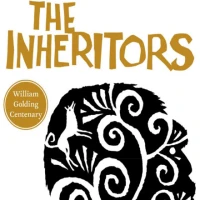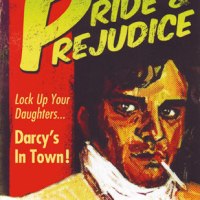The Pendragon Legend, by Antal Szerb
Antal Szerb is best known for his second novel, Journey by Moonlight, which was published by Pushkin Press and proved something of a success for them. Before that though in 1934 he wrote his wonderful first novel – The Pendragon Legend.
The Pendragon Legend is a hard book to describe. It mixes (and gently lampoons) elements of detective fiction, romance, gothic horror and more in a combination which shouldn’t work but which undoubtedly does. It’s well written, it’s huge fun to read and it’s incredibly playful which just isn’t a word I get to use often enough about books I read.
I didn’t actually buy The Pendragon Legend. My wife bought it after thoroughly enjoying his other work (though she hasn’t had time to read this one yet). Even with it sitting on the shelf the book just didn’t grab me though and it wasn’t until I read William Rycroft’s review of it at his Just William’s Luck blog here that I moved it to the top of my to be read pile.
So, what’s it all about? Well, where to start? The narrator, Janos Bátky, is a scholar of irrelevant subjects currently writing about Seventeenth Century mystics. He is introduced by accident at a party to the reclusive Earl of Gwynedd. The Earl invites Bátky to visit his family seat and to see his library there and Bátky excitedly accepts. The Earl’s family is an ancient one, the ancestral seat is Pendragon Castle in Wales and the Earl’s library promises to have books on Seventeenth Century alchemist Robert Fludd which no other library possesses. For a scholar of the subject it’s an extraordinary opportunity and one that will make Bátky the envy of his scholastic colleagues. That’s no small thing, for as Bátky says:
A colleague’s envy, when all is said and done, is the scholar’s one reward on earth.
Soon however mysterious events begin to occur. Bátky receives a threatening telephone call (the conversation is quoted over at Just William’s Luck, it’s worth reading) and is befriended in the Reading Room of the British Library by an athletic if unlettered young Irishman from Connemara who tells the most extraordinary tall tales and attaches himself to Bátky without delay. Maloney is the Irishman’s name, and it turns out he is heading to Pendragon Castle too in the company of the Earl’s nephew. Bátky is an unworldly sort and though he has some suspicions about his new Connemaran acquaintance the fellow is so likeable that he ends up travelling with him anyway.
From their the plot goes on to feature what may or may not be ghosts, ancient and bewildering customs of the nobility, death threats and assassination attempts, alchemy, Rosicrucians, the Comte de Saint-Germain, Casanova, Satanism, the Philosopher’s Stone, the terrible state of English cuisine and the difficulties of getting a good cup of coffee in Britain. Actually, there’s a lot more than that, but I have to stop the list somewhere…
It sounds cluttered. It sounds too like a Dan Brown plot. But even though it’s only a little over 300 pages (and that in Pushkin’s Gem format so they’re smaller than usual pages) Szerb’s grasp of pace is such that not only is it not in fact cluttered at all but actually there’s space for digressions and romantic subplots and a great deal of gentle observational humour. The plot is slightly Dan Brownian, but Szerb is well aware of how silly it all is and that’s part of the fun. What in a bad writer like Brown is painful here becomes almost a celebration of human eccentricity and folly.
Bátky is an engaging but flawed hero. He’s a terrible snob who is utterly in love with the English (and Welsh) aristocracy. He’s passionate about women, but prefers them beautiful and intellectually unchallenging and is slightly threatened by those who don’t fit his criteria. He’s vain too (at one point he smiles sardonically to himself, then reflects that it’s a wasted gesture as nobody is there to see it). None of these are terrible faults though, rather they’re more in the line of human failings and on the positive side he’s charming, polite, romantic and at times quite brave given he’s hardly a man of action. He’s a European intellectual in love with Britain and the British, as Szerb himself was, but above all he loves books. Here, for the first time, he sees the Earl’s library:
I was filled with the tenderness I always feel – and which nothing can match – when I encounter so many books together. At moments like this I long to wallow, to bathe in them, to savour their wonderful, dusty, old-book odours, to inhale them through my very pores.
The novel’s other characters (all seen through Bátky’s eyes) are affectionate stereotypes. Maloney is an entertaining and adventurous fellow fond of rhetoric and stories. The Earl’s nephew is an Englishman so reserved he cannot comfortably sit next to a woman, let alone talk to one. The Earl’s niece is distinctly Welsh and so a committed romantic. Bátky is helped at times by one of his friends, Lena, a buxom and highly efficient German woman with who has a tendency to take control of situations she finds herself in (again, see William’s blog for some wonderful dialogue describing her). They all embody in a way their countries, as perhaps does Bátky himself. None of it is terribly serious.
As the novel continues dark events occur and hints arise that there may be supernatural forces at work. Dire prophecies are heard and seemingly inexplicable ghostly happenings. Here Bátky and others investigate a voice coming seemingly out of an empty room which a servant believes to be the ghost of a local man:
“How could it be the ghost of old Pierce?” said another. “He’s still alive.”
“It could be his double. It happened to my uncle. It went and got completely drunk down at the Elephant, and the next day he had to pay the whole bill.”
There’s tons of plot, and yet it’s not a plot driven novel. Rather the plot is there because detective novels are plot heavy and that’s one of the genres Szerb is playing with. Equally ghost ridden ancient castles, strange legends and curious inhabitants of remote places are all staples of gothic horror and Szerb plays with that too. Bátky becomes involved with the Earl’s niece, among other women, and his German friend Lena takes a fancy to the Earl’s nephew. There is a perilous conspiracy, misunderstandings and comic escapades, and still there is time for love. It’s extraordinary that Szerb manages to fit it all in so well.
I’m obviously not going to discuss the ending or what’s really going on. I can say though without fear of spoilers that in places the book does dabble in darker territories, like the ancient alchemists and mystics Bátky is so fascinated by. There’s a warmth and humanity and a profound sense that we’re all a little absurd running through this novel, but there’s a recognition too that there are parts of us that aren’t funny at all. Szerb lived at a time when irrational beliefs were once again on the rise. Ideas of German nationalism and racial destiny were live issues, and philosophies that belonged in history books were alive and well and being used for tremendous harm. The Pendragon Legend is a comic novel, but it’s one that recognises that myths can be dangerous things.
I’ll draw this piece to a close with one final quote. In a piece in the Guardian Nicholas Lezard makes a comparison with Waugh (which he rightly warns should not be overextended). Lezard speaks of Waugh and Szerb’s irony and deadpan technique, and I think this description of the Café Royal illustrates just that quality nicely.
The Café Royal is effectively London’s only real café. It aims at Frenchness in every detail. As if the place had been built by Napoleon himself, the grand entrance, the doorman’s cap, and even the cups and spoons are adorned with a capital N crowned with laurel. Coffee is served in glasses; the air is so foul and the chairs so very uncomfortable it’s as if you really were in Paris. It was once the meeting place of the British intelligentsia, and the clientele has remained interesting to this day, consisting mainly of aspiring actresses and clever foreigners.
The Pendragon Necklace is translated by Len Rix who has also translated Szerb’s two other novels for Pushkin Press. It’s a translation so smooth you’d think it was written in English in the first place. It’s a wonderful piece of work, and I’d regard Rix’s name on a book as a distinct recommendation. There’s an interesting interview with him here with a Hungarian literature webzine which is well worth reading.
The Pendragon Legend. Interestingly, mine had a different cover, suggesting that Pushkin may have reissued it in a new format since the copy I read. Tragically, Szerb is yet another author murdered by the Nazis. As I’ve said before with other writers Pushkin Press have helped me discover, they have my thanks for helping bring him back for a new audience.














Hello:
I saw that you were reading this one, so I’ve been waiting for the review. I think I’ll pass on it as I wasn’t that keen on Journey by Moonlight. Did like the bit about the wasted sardonic smile.
Sounds great Max. I liked Journey by Moonlight without finding it the masterpiece that some (ie Lezard) claimed it to be. I was inclined to read Szerb’s other stuff in any case but your review makes this a definite.
I’ve not read the others yet Guy, but my strong impression is that if you didn’t like Moonlight you won’t like this. His style apparently got darker, but the essence remained the same.
Leroy, I read your comments over at Guy’s blog about Moonlight. I like Lezard’s reviews, but he’s very much a fan of Pushkin’s Central European releases (as am I to be fair, so who am I to criticise him on it?).
Where I think this does sometimes get oversold is I’ve seen it suggested it has great psychological depths. I’m not sure that’s quite right. It has definite undercurrents that I allude to above but I wouldn’t go in expecting a masterpiece of psychological analysis. That’s not really the point.
There is stuff going on here that’s more than surface, but I think it’s better approached as a fun novel with some deeper elements than going in expecting something profound.
Looking back up the page I see I described it as well written, huge fun and incredibly playful. I’m still happy with that this morning.
Yes, Lezard is clearly a fan and his championing of Pushkin is entirely to be commended. He’s big on Zweig as well. I’m glad he highlighted Szerb and I got much more from Journey then perhaps my slight disappointment suggests. There’s a nice episode in that book involving a wife, a Persian, a strange isolated house, a communicating door and some heavy furniture that strikes the exact notes (playfulness, absurdity, a whiff of real danger) you mention.
Your comments about Len Rix could equally well apply to Journey – thanks for the link, will read the article later when time permits.
Nice contrast with the dreaded Dan Brown as well…I’ve read your genre thread with interest so interesting to see him pop up again.
Max: I didn’t dislike Journey but it didn’t thrill me. I found parts boring–although I did like the novel’s playfulness a great deal.
Well, I did fine J by M a bit of a masterpiece – definitely up there with the best, but this one seems very different and I’m not sure what to make of it. I’m not sure about a Hungarian writing about Wales ! If he makes a good job of that then he really must be a good writer.
Great review Max, you brought it all back to me. I’ve just finished Journey By Moonlight coincidentally (review will be up on the blog soon), what a very different book it is. Despite the differences it shows what a keen intelligence Szerb brought to both novels and his ability to do something rather daring towards the end of booth books too. How brilliant of Pushkin Press to make his work available to us all once again.
Thanks for the correction Guy. Nice to see divided opinions actually on this one, it always adds interest.
Tom, in a sense he’s writing more about the idea of Wales. Nothing is quite naturalistic, this is a romantic Wales, the Wales one might hope to find if one were a Continental traveller to the place. All the nations and nationalities are slightly (and intentionally) stereotyped here.
William, looking forward to your JtM review. Pushkin have done a great job bringing this back to us, I quite agree.
And here it is:
http://justwilliamsluck.blogspot.com/2010/06/really-important-things-usually-lie-in.html
Hurrah! Thanks William, I’ll print it off and have a read.
Pingback: Objects in the rearview mirror… | Pechorin’s Journal
I’m rethinking this one now after TCT.
A lovely book, and I appreciate your review even more having just finished it Max. At one point I found myself having those Dan Brown-ish thoughts as well, except that Szerb has written something charming, funny and engrossing. I was particularly tickled by Maloney attributing fakir-like powers to “we Connemarans,” including night-vision, preternatural balance etc.
It makes me want to re-read Journey by Moonlight. Superb job by Rix, as you’ve rightly highlighted.
Good to see this getting comments again. Charming, funny and engrossing. Absolutely.
Journey by Moonlight remains one of my wife’s favourite novels. Superb stuff.
Pingback: I, János Bátky, Hungarian citizen, come face to face with Englishness, Welshness and Irishness « Book Around The Corner
Pingback: My Hungarian literature month | Pechorin’s Journal
Pingback: the real test of life was uncertainty | Pechorin’s Journal
Fab review, Max. It’s been a while since I read Pendragon, but it’s coming back to me now. I love the way this novel riffs with elements from the gothic and mystery genre. And you’re right, despite the sheer amount of plot it feels nimble; how did Szerb manage to pull it off? It’s interesting you mention the points about German nationalism and racial identity as I think there is a deeper undercurrent to this novel. I might have to read it again, but I got the impression that Szerb was trying to say something about the dangers of believing in a certain ideology…how as humans we can get swept up by a belief that may lead us down a tragic pathway.
I hadn’t realised Will had reviewed this too. Lena’s my favourite character from the book so I’ll have to take a look at Will’s post.
I think part of it is a warning about the dangers of ideology, but of course it’s also a comic novel, and one that riffs as you say from the gothic and mystery genres. It’s a lot packed in a surprisingly light and readable book. Absolutely brilliant. Glad you liked it too.
Pingback: Life was not an art-form, or rather, it was an extremely mixed genre. | Pechorin's Journal